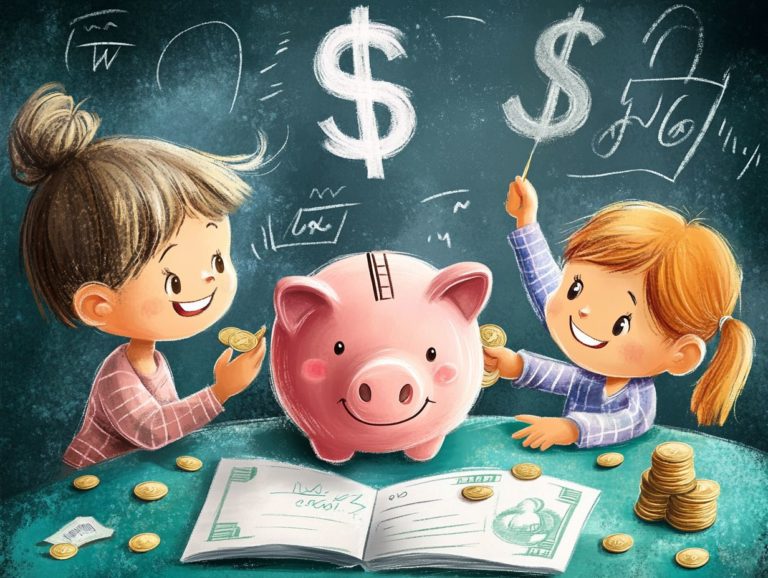How Can Kids Grow Their Money with Real-Life Examples?

Neale Godfrey is the financial voice for women and multi-generations and a world-renowned speaker and author, who has inspired millions through her work. She motivates, trains, educates, and frankly, entertains by delivering her core message: Empower yourself to take control of your financial life.
Financial literacy is an essential skill that can set kids up for a successful financial future.
Understanding money management Teaching kids about managing money helps them make informed decisions.
This article discusses why it’s important for kids to learn about money and provides motivating examples. real-life examples of young money-makers, and provides practical tips and resources for growing their wealth.
By developing these skills early, children can create a strong foundation for lifelong financial health.
Key Takeaways:
What is Financial Literacy for Kids?

Teaching kids how to manage money involves showing them the basics of spending and saving wisely, and how education and skills can lead to higher earnings later on.
Kids should learn how to budget and spend carefully early on to build a strong financial foundation. Lessons on these topics help children become financially responsible adults. For more insights into the foundational aspects of financial literacy, the Capital One guide on financial literacy is a respected source that outlines key concepts crucial for developing these habits. Additionally, for parents looking for practical ways to instill these skills, our article on how allowances teach kids financial responsibility offers valuable strategies.
Why is it Important for Kids to Learn About Money Management?
Teaching kids about handling money is important because it helps them create a strong base for their later years.
When children learn how to manage money, they can make wise decisions, avoid debt, and improve their earning potential as they get older. For those interested in a comprehensive overview, this analysis by ResearchGate covers the full spectrum of implications of early financial education on lifelong prosperity.
The lessons from managing credit and debt can greatly affect their ability to handle money matters throughout their lives. Parents can further support their children by understanding how allowances teach kids financial responsibility and instill greater financial literacy from an early age.
What Are Some Real-Life Examples of Kids Growing Their Money?
There are many real-life stories of kids successfully increasing their money through different methods like creative thinking and using basic business skills.
Young business-minded kids have taken on tasks like running lemonade stands, using online platforms such as YouTube and Fiverr, or even tutoring to save money and improve their knowledge of finance.
Learning about choices such as savings accounts and ways to invest can help kids handle their money better.
1. Starting a Small Business
Starting a small business can be an excellent way for kids to learn about financial literacy while earning money. Children can learn about business, money management, and wise spending through simple activities like running a lemonade stand or providing services such as yard sales, dog walking, or tutoring.
Engaging in such activities helps develop essential life skills, including budgeting, marketing, and customer service. Each venture serves as a hands-on experience, allowing kids to grasp the value of money and the importance of saving for their goals.
They learn to analyze costs and earnings, which helps them develop skills in thinking critically and solving problems. By putting their ideas into action, they gain confidence and a sense of responsibility that can benefit them throughout their lives.
These small projects inspire creativity and flexibility, important qualities in today’s constantly changing environment.
2. Investing in Stocks or Real Estate

Investing in stocks or real estate is a powerful way for kids to learn about compound interest and grow their money over time. Teaching kids the basics of investing helps them learn the good things about making wise money choices as they get older and gives them a strong starting point for learning about money.
Teaching children about investing gives them knowledge and helps them learn to manage money responsibly.
Engaging with concepts like dividends and property appreciation helps children realize how their money can work for them through the magic of compound interest. This early experience gives them important skills for managing money over time, helping them decide wisely about saving and investing. For a more in-depth understanding, Morgan Stanley offers a comprehensive guide titled “Investing 101: A Beginner’s Guide”, which can provide further insights into these concepts.
As they see their investments grow, kids can build confidence in handling financial difficulties, helping them achieve a stable and successful life.
3. Saving and Budgeting Their Allowance
Saving and budgeting their allowance is one of the first steps kids can take towards developing good financial habits. By learning to allocate their funds wisely, children can set financial goals and practice responsible spending, leading to informed decisions that will benefit them in the long run.
Creating a budget might seem hard at first, but it can be easy if you split your income into sections like saving, spending, and giving.
Children can monitor their spending with colorful graphs or enjoyable apps, which makes learning about money interesting and informative. This encourages responsibility and teaches young people the importance of money.
When they save part of their pocket money for a toy they want or a special trip, they learn to wait for things they want, an important ability for growing up.
Displaying these habits creates a strong foundation for grasping money, which aids them in handling their finances effectively in the future.
4. Participating in Financial Education Programs
Children can learn important skills for managing money through financial education programs. These programs teach crucial topics such as understanding credit, creating budgets, and spending money wisely, helping kids make informed choices about managing their money.
By engaging in interactive activities and real-life scenarios, children can learn how to prioritize their expenses, recognize the value of saving, and differentiate between needs and wants.
These educational programs help people feel more confident in handling money and build a basic knowledge of finances.
These programs offer tools and advice to help people make smart financial choices, manage their money, and choose the right investments.
What Are Some Tips for Kids to Grow Their Money?
To help kids increase their savings, they can use these important tips:
- Setting financial goals
- Creating a budget
- Learning about saving and investing
By using these strategies early on, children can develop a solid grasp of money management that will benefit them throughout their lives. For instance, knowing how to save and track money effectively not only builds their financial confidence but also empowers them to manage their resources wisely.
1. Set Financial Goals

Setting financial goals is an important part of helping a child learn how to manage money effectively. By identifying specific savings targets, kids can better understand budgeting and develop saving habits that align with their aspirations.
When children set clear and achievable financial goals, they learn the significance of planning for both the short and long term.
For instance, a short-term goal could involve saving for a new toy or game, which teaches the importance of patience and diligence in reaching targets. Conversely, a long-term goal, such as saving for a bicycle or even a computer, illustrates the concept of delayed gratification and how consistent savings contribute to bigger achievements.
These experiences make handling finances not just a task but an engaging path toward independence and responsibility.
2. Create a Budget
Creating a budget is an essential skill for kids to learn as it allows them to manage their money effectively and make informed financial decisions. By creating a budget, children can decide what to spend money on, spend responsibly, and save for goals.
To guide children in managing their money, it is important to explain where their money comes from. This can include allowances, gifts, or any small jobs they might have.
Learning about expenses is just as important. Kids should learn to separate their spending into things they need, like school supplies, and things they want, like toys or video games.
Including a savings plan helps them put money aside for emergencies or expensive purchases, building the habit of saving early.
To make budgeting more engaging, introducing tracking methods like colorful charts or apps designed for kids can simplify the process and provide visual motivation, allowing them to adjust their plans as their needs or goals change.
3. Learn About Investing
Learning how to invest is a key part of financial education and can greatly influence a child’s financial health. By learning basic investment strategies and how compound interest works, kids can see how their money can increase over time.
When children start investing early, they can use the time to increase their returns.
For example, starting with basic ideas like saving money in a piggy bank or opening a savings account can help them learn about stocks, bonds, and mutual funds.
A child who saves a small allowance can learn how depositing that amount regularly can accumulate and increase wealth over time.
Explaining market changes through stories or games can make learning about investments fun and simple, highlighting the importance of making wise financial decisions.
4. Start Saving Early
Starting to save early gives kids a head start on developing strong financial habits and maximizes the benefits of compound interest. By prioritizing saving, children can learn the importance of delayed gratification and the power of building a solid financial foundation.
When kids start saving early, they prepare for financial success later and learn how money can grow with compound interest.
As they watch their savings accumulate, the excitement of seeing their money multiply can be incredibly motivating. To encourage this practice, parents can introduce fun savings goals, such as saving for a desired toy or a special outing, and match their contributions to reinforce the habit.
Making saving enjoyable or involving them in discussions about money can help them feel more in charge and accountable for their finances.
What Are Some Resources for Kids to Learn About Money Management?

There are many resources for kids to learn about handling money, including educational programs, books, and online tools.
Using these materials can greatly improve a child’s knowledge of financial ideas and good money habits. For instance, various kids financial literacy games offer engaging ways to master money management skills while having fun.
1. Financial Education Programs
Financial education programs provide structured courses for children to learn about managing money. These courses cover learning about credit, making budgets, and saving money. These programs can significantly increase a child’s knowledge of money management.
By incorporating interactive lessons and real-world scenarios, these resources engage children in a way that textbooks often cannot.
Programs like Junior Achievement’s JA Finance Park and the National Endowment for Financial Education’s High School Financial Planning Program offer full courses that help young people learn essential skills for making wise financial decisions.
These programs use practical exercises and role-playing scenarios to teach important lessons on handling money and why saving is important. This type of education teaches useful skills and helps children form a good attitude toward money, so they learn to handle finances well as they grow up.
2. Books and Online Resources
Books and online resources are useful tools for kids wanting to learn about managing money and financial literacy. These materials provide helpful information about budgeting, saving money, and spending wisely in an interesting way.
By immersing themselves in these educational narratives and interactive platforms, children can grasp complex concepts easily and relate them to real-life situations.
The ‘The Berenstain Bears’ series offers fun stories that teach important money lessons, helping young readers remember them.
Online tools like ‘Khan Academy Kids’ present a variety of activities focused on financial principles, complete with quizzes and games that reinforce learning through play.
These resources help you learn about money matters and improve essential skills for thinking critically and making decisions, going beyond basic money handling.
3. Talking to Parents or Financial Advisors
Children can learn practical money management skills and grasp financial topics by having conversations with their parents or financial advisors. Engaging in discussions about personal finance helps children understand informed decisions and the real-life application of financial concepts.
These conversations serve as critical teaching moments, enabling youngsters to grasp the importance of budgeting, saving, and investing from an early age.
To help these conversations, parents can make the setting relaxed by welcoming questions and talking about their own money experiences, promoting honest discussion.
Talking to financial advisors can help families create plans specific to their needs, teaching their children about managing money.
By focusing on these discussions, they are teaching children about money matters, helping them handle financial situations with confidence.

Neale Godfrey is the financial voice for women and multi-generations and a world-renowned speaker and author, who has inspired millions through her work. She motivates, trains, educates, and frankly, entertains by delivering her core message: Empower yourself to take control of your financial life.






